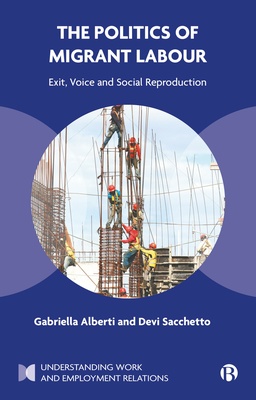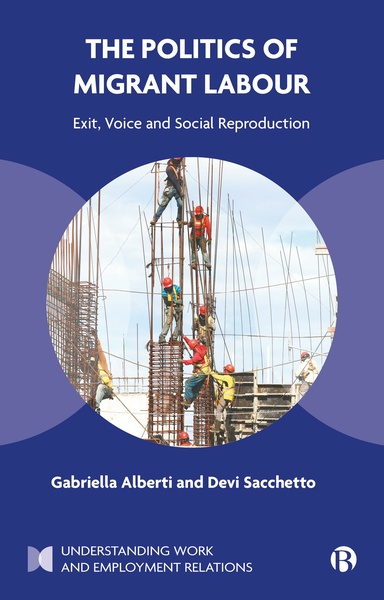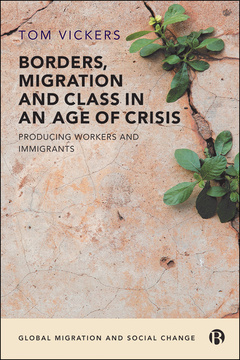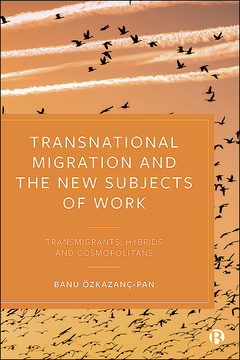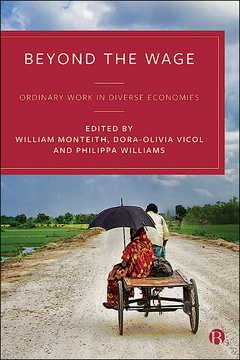The Politics of Migrant Labour
Exit, Voice, and Social Reproduction
By Gabriella Alberti and Devi Sacchetto
Published
Jul 15, 2025Page count
286 pagesBrowse the series
Understanding Work and Employment RelationsISBN
978-1529227741Dimensions
234 x 156 mmImprint
Bristol University PressPublished
Jan 22, 2024Page count
286 pagesBrowse the series
Understanding Work and Employment RelationsISBN
978-1529227734Dimensions
234 x 156 mmImprint
Bristol University PressPublished
Jan 22, 2024Page count
286 pagesBrowse the series
Understanding Work and Employment RelationsISBN
978-1529227758Dimensions
234 x 156 mmImprint
Bristol University PressPublished
Jan 22, 2024Page count
286 pagesBrowse the series
Understanding Work and Employment RelationsISBN
978-1529227758Dimensions
234 x 156 mmImprint
Bristol University PressIn the media:
The Politics of Migrant Labour is reviewed in BJIR
The turnover of labour and its significance for workers and employers has usually been considered at the organizational level as individual exit behaviour, and seldom in relation to the cross-border mobility practices of migrant workers within and without the workplace.
Drawing from labour process theory, the autonomy of migration, social reproduction, and industrial relations, this book explores the relationship between labour mobility and international migration under a global and historical perspective.
Uncovering both the individual and collective actions by migrants inside and outside worker organizations, the authors develop a new understanding of migrants’ everyday mobilities as creative and life-sustaining strategies of social reproduction and labour conflict.
"This book provides a fresh perspective on understanding the politics of migrant labour today. I would recommend it to students and researchers interested in the sociology of work and employment, as well as industrial relations scholars and academics in labour studies." An International Journal of Employment Relations
"A sorely needed theoretical dive, laying the groundwork for research centring migrant agency, its diverse expressions, and the dynamics shaping labour mobility—a critical read for scholars across disciplines." Organization
“An exciting exposition of mobility in modern work. It unites labour process theory and migration theory, in a coherent synthesis around labour mobility and migration, with many illustrative cases that back up carefully crafted analysis. It’s a must-read for anyone interested in work in the modern world.” Chris Smith, Royal Holloway, University of London
"In a historical moment where the immobilization and persecution of migration dominates public discourse and political governance, this rare and important book reveals that labour struggles and migration movements are inseparable. It makes a renewed case for the power of autonomy and migrant mobility to unsettle the rise of regressive nationalism and upend the capital control of work and social reproduction." Dimitris Papadopoulos, University of California, Santa Cruz
Gabriella Alberti is Associate Professor of Work and Employment Relations and Researcher at the Centre for Employment Relations Innovation and Change (CERIC) at the University of Leeds.
Devi Sacchetto is Professor of Sociology of Work at the Department of Philosophy, Sociology, Education and Applied Psychology at the University of Padova,.
Introduction: Migration and Labour Turnover
1. Theorizing Labour Mobility Power
2. The Logistics of Living Labour
3. Enclaves of Differentiated Labour
4. The Field of Social Reproduction
5. Migrant Organizing
Conclusion: Rethinking Worker Power Through Mobility







